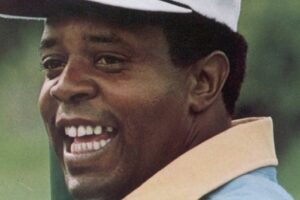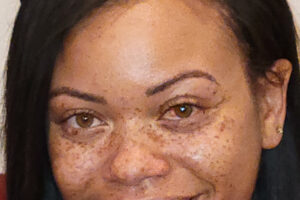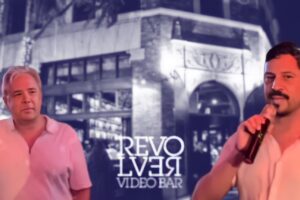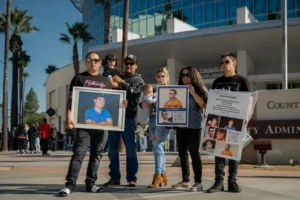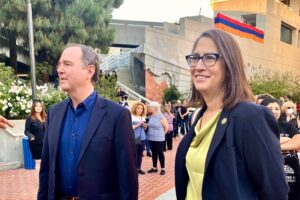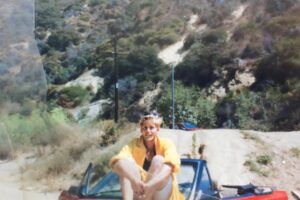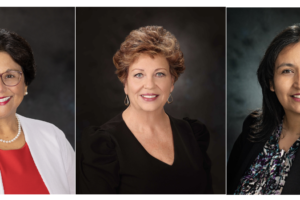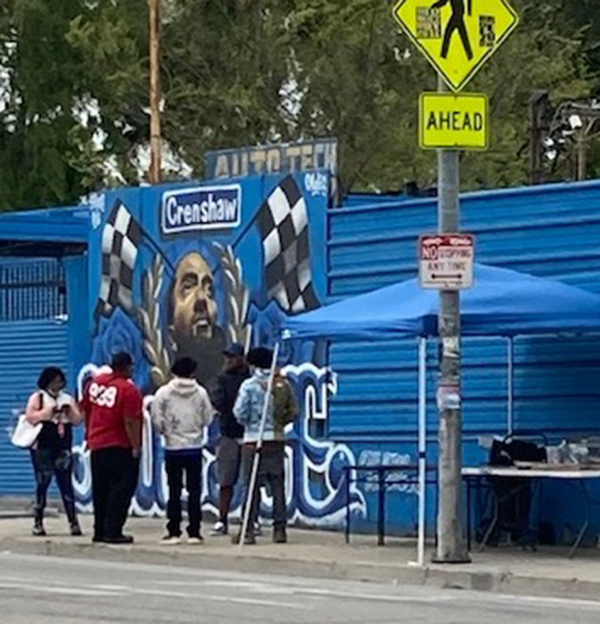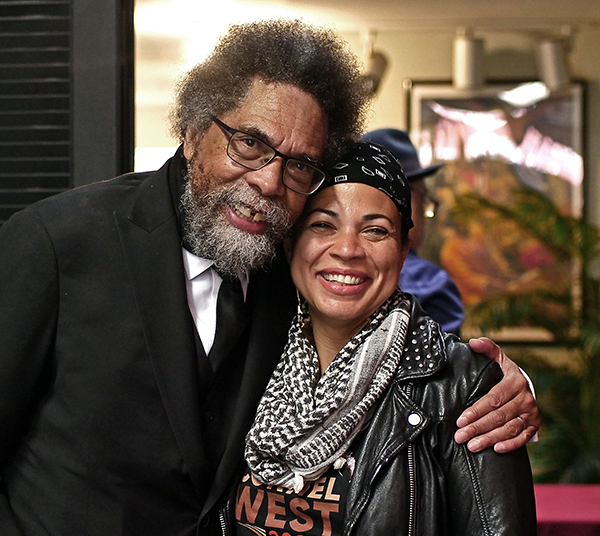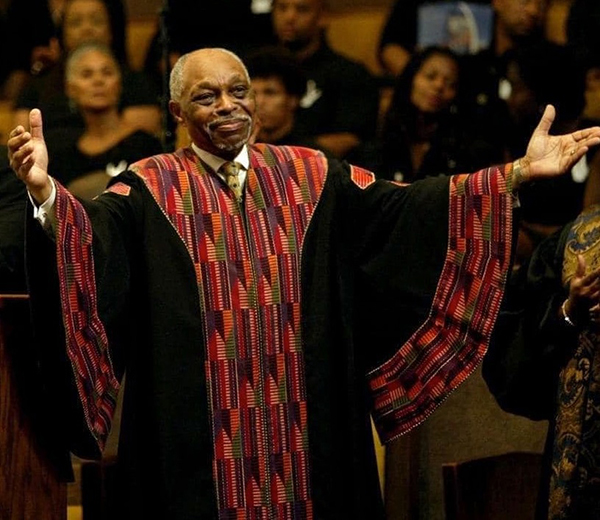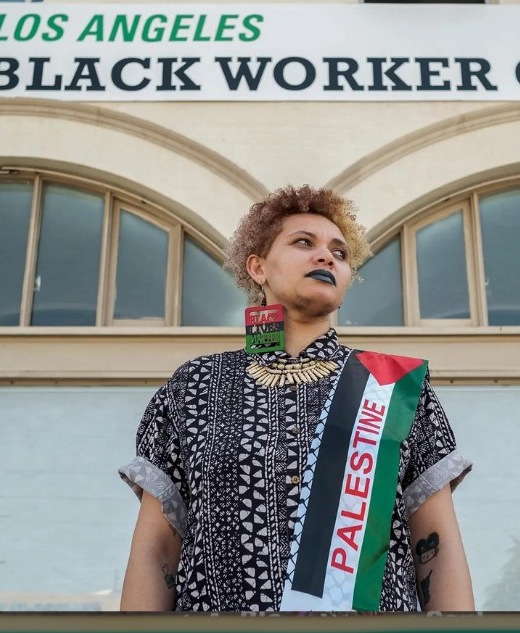By Sue Favor
Contributing Writer
SOUTH LOS ANGELES — During weekday early evening hours, eastbound traffic on West Slauson Avenue can be backed up almost a half mile as motorists struggle through one lane trying to get across Crenshaw Boulevard.
It is a scene that is familiar at numerous other tourist attractions in the area. But this spring, what is bringing increased attention, commerce — and controversy — to the infamous intersection are local merchants selling memorabilia featuring the late hip hop star Nipsey Hussle.
Their tables, set up in front of the closed lot that housed Hussle’s Marathon Clothing store, have stirred a community debate around entrepreneurship, opportunity and obeying laws. The situation has also sent the Los Angeles Police Department scrambling to control parking, traffic, business permits and increased crime and activity in the area.
“There are ongoing issues, ongoing problems — there is a lot happening,” said Officer Andre Dixon, the senior lead officer for the area.
Since Hussle was gunned down in front of his store more than two years ago, the spot has been a pilgrimage destination for fans. Though his family went to an online-only business model and shut down the small mall, the faithful come to walk through the alley that his killer allegedly used to get to the store. They have held phones up to holes in the plastic tarp that covers the gates to the parking lot to take pictures.
The merchants appeared as the city began lifting COVID-19 restrictions. Tables now line the sidewalk, presenting a tough challenge for pedestrians trying to squeeze through.
Sellers park their vehicles — one of which is a small passenger bus — next to their stands in a red “no parking” zone. Traffic is forced to go around, and during commuting hours, it stops completely in the right lane.
Police are challenged by both the illegal parking and resulting traffic issues and in having to enforce the city seller permit laws. Regulating the area is much easier said than done.
“We do traffic enforcement and we can write parking tickets and enforce speed violations,” Dixon said. “They move and then they’ll come right back. We can’t spend all day there.”
Dixon said the top priority for police and crews from the city Department of Transportation right now is controlling the traffic congestion between West and Crenshaw boulevards.
“We are still working on long-term solutions to get rid of the problems,” Dixon told the Park Mesa Heights Community Council last weekend. “We are figuring things out, and I’ve got a meeting with my captain next week to discuss one idea.”
The fact that the merchants sell on the sidewalk is also an issue, because it is illegal.
“They’re supposed to have a seller’s permit,” Dixon said. “We can go around asking if they have a permit, and we do. But then we become the retail police.”
Recently two merchants complied with Dixon’s request and obtained a permit from the city, but the presence of the outdoor market has sharply divided residents and business owners. Some defend their right to sell and say entrepreneurs should get help finding a permanent location for the market. Others say the sellers need to follow the rules and question their right to make money off of the Nipsey Hussle name.
Derrick Ford owns Off Da Hook Fish House in the mall next door to the former Marathon Clothing site. He welcomes the pop-up market, which he sees as a benefit to both the sellers and surrounding businesses.
“I feel like they’re doing good things,” Ford said. “They could be out here selling dope, they could be out here robbing and stealing. It’s a way for them to make legitimate money. (And) I get a lot of extra foot traffic from the tourists that are coming in.”
One longtime employee of a nearby business has seen the opposite effect. She said tourists park in any lot they can, which prevents access to other potential customers.
“We actually did lose a lot of clients because of the parking,” said the employee, who didn’t want to be identified. “People park their cars here and spend the afternoon, like it’s Disneyland.”
She said her store has also lost its disabled customers, who can’t bypass the booths on the sidewalk without stepping into traffic. Additionally, the increased visitor count to the area has resulted in an uptick in littering and dumping.
“Some people say [the vending] is a good thing, but the way they’re doing it isn’t right,” the employee said. “I’m not saying they don’t have the right to make money, but they have to do it the right way, and the way they’re doing it is so wrong. At first they had their cars parked on the sidewalk, like it was a parking spot.”
The same juxtaposing views boiled over at the recent community council meeting.
At-large representative Julia Smith said she is tired of the entrepreneurs being characterized as annoying gang bangers.
“Those people there are business people,” she said. “They are out there making money, selling their products, selling T-shirts, selling art.
“Until we can work on social equity and give these young people an opportunity to sell their goods in a safe environment, I want them to be safe; I don’t want them removed. I don’t want our young people to be criminalized and misunderstood.”
Smith said the sellers are seeking opportunity, and it is up to stakeholders to help them get it.
“Let’s come up with a win-win solution for the community, the police and the young people out there who are conducting business,” Smith said.
Dina Andrews, the senior field deputy for City Councilman Marqueece Harris-Dawson, fired back that Smith could be part of the team that helps the vendors get their selling permits, which would keep LAPD from having to deal with such issues.
“If we are going to help them, we need to help them put together their business plan and be in compliance. … We’re down for that,” Andrews said. “At the same time, they can’t block traffic.”
“In a perfect world, we would have somewhere for them to go, but I’m not sure if they’d want to go anywhere else, because the space that draws people is Nipsey Hussle’s property.”
A glance at the items merchants have for sale indicate Andrews might be right. Hussle’s image adorns T-shirts, jackets, phone cases and lighters. The Crenshaw name is also on sweat pants, beanies and other pieces of clothing. Vendors have the items made for them.
One seller, at a booth without a name, said he grew up in the same neighborhood as Hussle, whose real name was Ermias Asghedom. He said he is trying to keep Hussle’s memory alive, as well as provide convenience to customers.
“When you’re ordering from Marathon, you have to order online, and it’ll take a couple of months with back orders,” said Ronnie, who declined to give his last name. “The only people that’s (selling) over here is people from this neighborhood. It’s not anyone who doesn’t have ties to this neighborhood.”
For Dixon, who has spent several of his 27 years with LAPD patrolling the area, the fact that the corner is drawing more local residents can be problematic. He had the alley next to the Marathon lot closed with a temporary barrier to curb foot traffic, and police are working to learn who sometimes charges visitors a fee to “tour” the alley once they breach the barrier.
Others loiter in the area, many making it a point to take photos in front of a hand-painted Hussle mural on the side of an auto body shop on the north side of Slauson. In some cases, visitors start what Dixon called havoc. A few weeks ago, a small group climbed atop Slauson Donut and danced on the roof.
“It’s everything you can imagine happening over there: gambling, stopping traffic,” Dixon said. “When is it going to stop? It’s affecting the neighborhood.
“Business owners can’t say anything because they’re scared, but people drive by and see gang activity.”
Midday on May 6, the antics took a violent turn, as two men engaged in a running gun battle in which 19 rounds were exchanged near the corner. Police said no one was hit, but one vehicle was riddled with bullets.
Hussle was a member of the Rollin 60’s Neighborhood Crips gang as a youth, but broke away and began his music career, his clothing business and numerous social endeavors. As someone who knew Hussle through his store, Dixon said he doesn’t think he would approve of what’s going on at the corner today.
“He told me that he didn’t want that gang influence here, that it would scare customers away,” Dixon said. “He kept all of that away.”
It is a sentiment shared by one of the mechanics of the auto body shop, who helped paint the Hussle mural there.
“Nipsey was my friend,” said Antonio, who declined to give his last name. He shook his head and motioned toward the corner.
“He wouldn’t like this.”
The growing popularity of the intersection most likely has something to do with the fact that there is no public memorial for the rapper. Google map searchers can find “Nipsey Hussle Square” indicated on an internet map of the area, but there has been no formal designation as such.
City officials say they will create some kind of a tribute when the family is ready, but there is no indication as to when that will be.
Hussle’s family did not respond to a reporter’s request for comment.
Ford says it is time to create the spot.
“What they need to do for our community is to rope this area off and make it into a landmark,” he said. “Rope this off and create a memorial to Nipsey Hussle.”
Sue Favor is a freelance reporter for Wave Newspapers, who covers South Los Angeles. She can be reached at newsroom@wavepublication.com.

